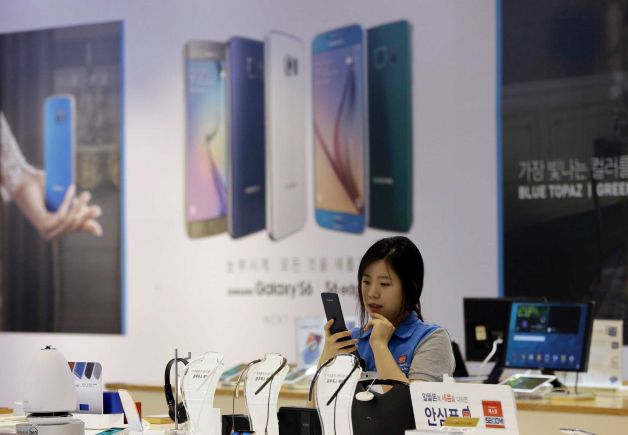- California Assembly OKs highest minimum wage in nation
- S. Korea unveils first graphic cigarette warnings
- US joins with South Korea, Japan in bid to deter North Korea
- LPGA golfer Chun In-gee finally back in action
- S. Korea won’t be top seed in final World Cup qualification round
- US men’s soccer misses 2nd straight Olympics
- US back on track in qualifying with 4-0 win over Guatemala
- High-intensity workout injuries spawn cottage industry
- CDC expands range of Zika mosquitoes into parts of Northeast
- Who knew? ‘The Walking Dead’ is helping families connect
Samsung loses ‘slide to unlock’ appeal suit against Apple

An employee of Samsung Electronics Co. watches a mobile phone near an advertisement of Samsung Electronics’ Galaxy S6 and S6 Edge smartphone at a Samsung Electronics shop in Seoul, South Korea, Thursday, July 30, 2015. (AP Photo/Ahn Young-joon)
By Kang Yoon-seung
SEOUL (Yonhap) — Samsung Electronics Co. has lost its lawsuit against Apple Inc. over the so-called “slide to unlock” feature on touch-screen smartphones, industry sources said Friday, a symbolic decision that will still have limited impact on the South Korean giant.
The U.S. Court of Appeals for the Federal Circuit said the patent infringement by Samsung led to a decline in sales of Apple products, sending the case back to a California federal court.
“And the evidence of record is that Samsung can effect the removal of the patented features without recalling any products or disrupting customer use of its products,” the court said. “Apple has not attempted to expand the scope of its monopoly.”
“Apple seeks only a narrow feature-based injunction commensurate in scope with its monopoly rights,” it added.
The U.S. District Court for the Northern District of California earlier ruled Samsung had not infringed Apple’s patent intentionally.
Industry watchers, however, said even though the latest decision is finalized, it will not effect Samsung’s smartphone sales as the South Korean tech giant has not been using the feature.
While the “slide to unlock” feature requires a user to touch a specific spot on the display, Samsung smartphones are now capable of being unlocked by swiping anywhere on the screen.
The decision, however, will act as a warning for China-based budget handset makers, which have been copying Apple devices’ key features.















